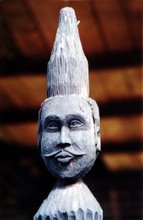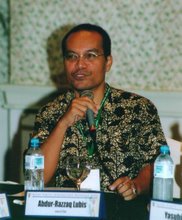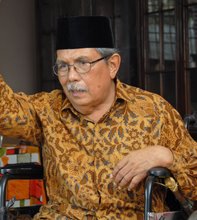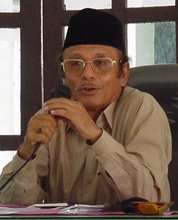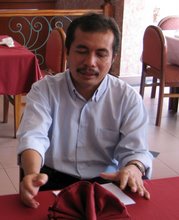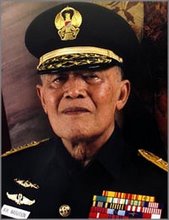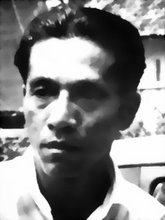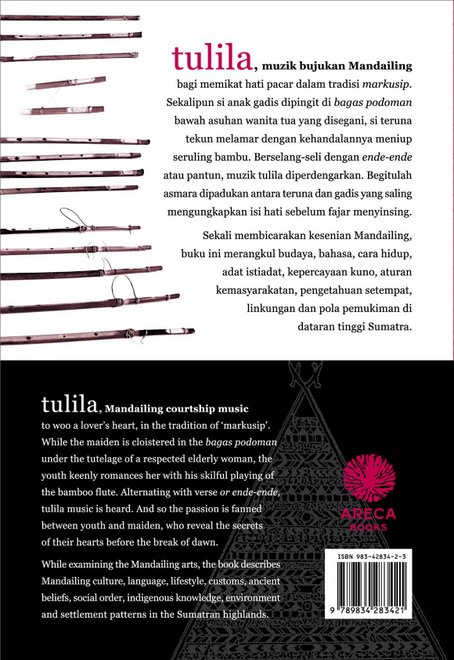
Abdul Haris Nasution
A Political Biography
by C.L.M. Penders and Ulf Sundhaussen[1]
St Lucia: University of Queensland Press, 1985
295 pages
ISBN 0 7022 1709 3
Apart from the late President Sukarno and his successor, General Suharto, no man has influenced recent Indonesian history as much as General Abdul Haris Nasution.
In the late 1940s he was the architect of the guerilla war against the Dutch which led to the granting of Indonesian independence. In the late 1950s, after the parliamentary system of government had broken down, Nasution, then commander of the army, developed his “middle way” concept by which the army neither abstained from involvement in politics nor took over the government but became the junior partner in a coalition with the civil authorities. In the 1960s he played a leading part in replacing the increasingly irresponsible regime of President Sukarno with more democratically oriented “New Order” of General Suharto. When this New Order failed to live up to his aspiration, Nasution became one of its most outspoken critics. Though his reformist zeal has deprived him of an official position of power, he has continued to exert an influence on Indonesia political life through his writing and lecturing.
The authors have made extensive use of Nasution’s own writings and have interviewed many of the leading figures in Indonesian political and military affairs as well as Nasution himself. The book contains important material not generally available on Nasution’s early life, his experiences during the Japanese occupation, his views on military strategy, his experiences as a civilian politician, and his basic political and moral values.
Nasution not only was an outstanding organizer and military commander; he is also the most prolific military historian of his country. As a military theorist he may be compared to Mad Zedong and General Giap. As a politician he was innovative and demonstrated true statesmanship. This book aims to give him the recognition he deserves.
C.L.M. Penders is a reader in the University of Queensland’s History Department. A graduate of the Australian National University, he is a specialist in South-East Asian history, particularly modern Indonesian. He was the general editor of University of Queensland Press’s series: Sources of Modern Indonesian History and Politics.
Ulf Sundhaussen is senior lecturer in the Department of Government, University of Queensland. Born in Germany, he was educated in Berlin and Monash University, Melbourne. He is the author of The Road to Power: Indonesian Military Politics 1945-1967 (1982) and number articles and monographs on Indonesia.
[1] Penders is also the author of the much acclaimed, The Life and Times of Sukarno, Kuala Lumpur: Oxford University Press, 1974.
A Political Biography
by C.L.M. Penders and Ulf Sundhaussen[1]
St Lucia: University of Queensland Press, 1985
295 pages
ISBN 0 7022 1709 3
Apart from the late President Sukarno and his successor, General Suharto, no man has influenced recent Indonesian history as much as General Abdul Haris Nasution.
In the late 1940s he was the architect of the guerilla war against the Dutch which led to the granting of Indonesian independence. In the late 1950s, after the parliamentary system of government had broken down, Nasution, then commander of the army, developed his “middle way” concept by which the army neither abstained from involvement in politics nor took over the government but became the junior partner in a coalition with the civil authorities. In the 1960s he played a leading part in replacing the increasingly irresponsible regime of President Sukarno with more democratically oriented “New Order” of General Suharto. When this New Order failed to live up to his aspiration, Nasution became one of its most outspoken critics. Though his reformist zeal has deprived him of an official position of power, he has continued to exert an influence on Indonesia political life through his writing and lecturing.
The authors have made extensive use of Nasution’s own writings and have interviewed many of the leading figures in Indonesian political and military affairs as well as Nasution himself. The book contains important material not generally available on Nasution’s early life, his experiences during the Japanese occupation, his views on military strategy, his experiences as a civilian politician, and his basic political and moral values.
Nasution not only was an outstanding organizer and military commander; he is also the most prolific military historian of his country. As a military theorist he may be compared to Mad Zedong and General Giap. As a politician he was innovative and demonstrated true statesmanship. This book aims to give him the recognition he deserves.
C.L.M. Penders is a reader in the University of Queensland’s History Department. A graduate of the Australian National University, he is a specialist in South-East Asian history, particularly modern Indonesian. He was the general editor of University of Queensland Press’s series: Sources of Modern Indonesian History and Politics.
Ulf Sundhaussen is senior lecturer in the Department of Government, University of Queensland. Born in Germany, he was educated in Berlin and Monash University, Melbourne. He is the author of The Road to Power: Indonesian Military Politics 1945-1967 (1982) and number articles and monographs on Indonesia.
[1] Penders is also the author of the much acclaimed, The Life and Times of Sukarno, Kuala Lumpur: Oxford University Press, 1974.
